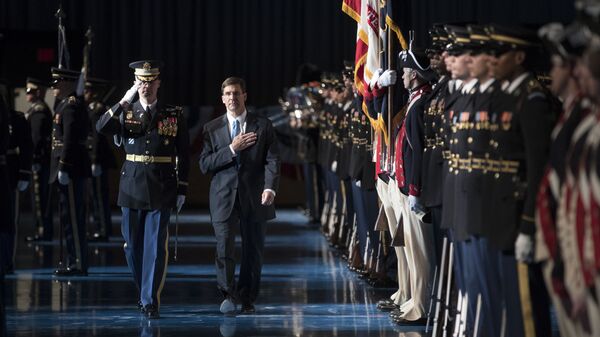US Secretary of Defence Mark Esper has presented a laundry list of problem nations which he said Washington must confront, calling out traditional US foes like North Korea and Iran, while classifying Russia and China as dangerous competitors who threaten the global order.
Speaking at Johns Hopkins University's school of international studies on Thursday, Esper cited the 2018 National Defence Strategy, which he said “outlined the United States’ plan to maintain competitive advantage in a new era of great power competition, where revisionist powers seek to rewrite the international rules based order and the norms of good behaviour.”
“Take China and Russia,” Esper continued. “Both countries have violated the sovereignty of their neighbours, and routinely used coercive strategies against smaller states to gain strategic advantages.”
Accusing China of engaging in intellectual property theft, Esper suggested that the country was trying to “control the economic and security decisions” of other countries with its Belt and Road trade route investments.
“Meanwhile, Moscow has turned to hybrid warfare as a means to expand regional influence at the expense of law-abiding nations while also breaking treaty obligations and engaging in malicious cyber operations," the Pentagon chief claimed.
“We also face continued threats from rogue states like Iran and North Korea,” Esper noted, saying these threats “require our constant, constant vigilance.”
According to the defence secretary, the US military will be dealing with these threats in the future via a three-pronged strategy which includes increasing military readiness and spending billions of dollars to modernize and create a “more lethal force,” as well as building new alliances and reforming the DoD to improve efficiency. The US effort will include ‘engagement’ with countries in the Indo-Pacific region to try to contain China, and a further buildup of NATO against Russia.
US Vs. Russia and China: Comparing Spending and Foreign Deployments
In late 2019, President Donald Trump signed the 2020 National Defence Authorization Act into law, approving $738 billion in defence spending for the fiscal year beginning in October 2020, including an additional $71.5 billion for ‘overseas contingency funding’ (i.e. the nation’s war budget). The US spends more on defence than the next seven countries combined, with the NATO alliance’s total spending topping $1 trillion in 2018. For comparison, Russia spent $48 billion on defence in 2019, while China committed $175.4 billion during the same period.
The US far outweighs its Russian and Chinese competitors on military bases abroad, as well, with about 800 bases in over 70 countries and territories around the world. Russia, for comparison, has two military facilities in Syria, as well as forces in the post-Soviet states of Armenia, Belarus, Kazakhstan, Kyrgyzstan and Tajikistan for a total of about a dozen facilities. China has a support base in Djibouti in Africa, as well as a naval intelligence base in Myanmar.




